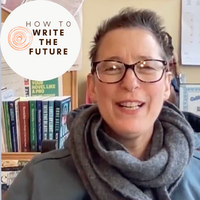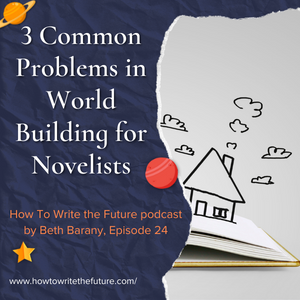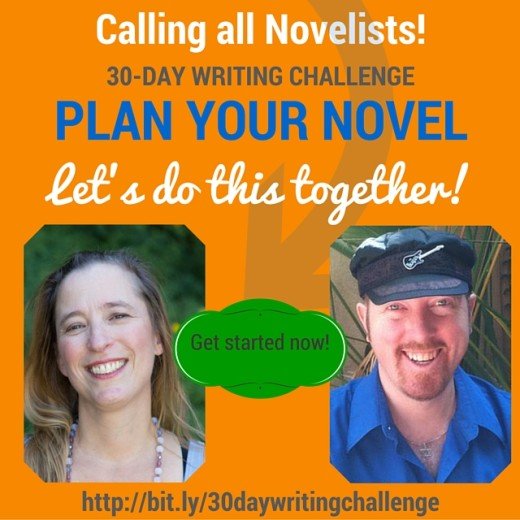3 Common Problems in World Building for Novelists
In this How To Write the Future podcast episode, Beth Barany shares 3 Common Problems in World Building for Novelists and one piece of advice for writers to get started on creating vivid worlds for their stories.
Platforms the podcast is available on include Apple Podcasts | Google Podcasts | Spotify | Buzzsprout | Amazon Music | Podcast Addict | Youtube
ABOUT BETH BARANY
 Beth Barany teaches science fiction and fantasy novelists how to write, edit, and publish their books as a coach, teacher, consultant, and developmental editor. She’s an award-winning fantasy and science fiction novelist and runs the podcast, “How To Write The Future.”
Beth Barany teaches science fiction and fantasy novelists how to write, edit, and publish their books as a coach, teacher, consultant, and developmental editor. She’s an award-winning fantasy and science fiction novelist and runs the podcast, “How To Write The Future.”
Learn more about Beth Barany at these sites:
Author site / Coaching site / School of Fiction / Writer’s Fun Zone blog
RESOURCES
Get support for your fiction writing by a novelist and writing teacher and coach. Schedule an exploratory call here and see if Beth can support you today:
https://writersfunzone.com/blog/discovery-call/
Share your What-if scenario here:
https://writersfunzone.com/blog/podcast/#contact
Sign up for the 30-minute Story Success Clinic here:
https://writersfunzone.com/blog/story-success-clinic/
Your Writing Process session ($99 for 60-minutes) (Jan. 2023 only, limited to the first 10 spots)
https://writersfunzone.com/blog/your-writing-process-assessment/
SHOW NOTES
“Our job as fiction writers is to evoke emotion in the reader.”
In this episode of How To Write the Future, titled “3 Common Problems in World Building for Novelists,” Beth Barany, creativity coach and science fiction and fantasy novelist, shares 3 common problems for novelists in world-building, answers some recurring questions that she often gets asked, and reveals one piece of advice for you to get started on creating vivid worlds for your stories.
ABOUT THE HOW TO WRITE THE FUTURE PODCAST
The How To Write The Future podcast is for science fiction and fantasy writers who want to write positive futures and successfully bring those stories out into the marketplace. Hosted by Beth Barany, science fiction novelist and creativity coach for writers.
Tips for fiction writers!
This podcast is for you if you have questions like:
- How do I create a believable world for my science fiction story?
- How do figure what’s not working if my story feels flat?
- How do I make my story more interesting and alive?
This podcast is for readers too if you’re at all curious about the future of humanity.
Transcript for Episode 24 3 Common Problems in World Building for Novelists
Are you stuck with your story and don’t know how to get unstuck?
Are you a novelist who wishes to be more prolific?
Or maybe you’ve written that first draft and you just don’t know how to make it better.
Then sign up today for a No Obligation Discovery Call with me Beth Barany, Creativity Coach and award-winning science fiction and fantasy novelist.
I look forward to seeing how I can help you.
So sign up today. The link is in the show notes. And now let’s get on with the show.
Welcome
Hi everyone. I’m Beth Barany.
I am your host for How to Write the Future Podcast, a podcast for science fiction and fantasy writers and anybody who cares about the future and cares about creating positive, optimistic futures.
I’m a creativity coach and writing teacher for science fiction and fantasy writers who want to write, edit, publish and market their novels. I’m bringing to you today this world-building class so that you can enrich the worlds that your character is in and make your stories come alive.
Common Questions and Problems about World Building in Fiction
Here are some common questions I get about world-building.
Only Applies to Science Fiction and Fantasy, right? 01:24
Number one, people say world-building only applies to science fiction and fantasy, right?
And I say, actually no, you need to take your time to think about your world, even if you are writing stories set in a contemporary time and place, and here’s why.
There’s a few different reasons why.
Firstly, your readers may not know your setting. They may not be from the region that you are writing about.
Write the setting in a way that allows your reader to fully explore it as it is relevant to the characters in your story.
The other reason why you want to design your setting, even a contemporary setting, in a way that’s rich, is so that the readers get an immersive experience.
And lastly, your setting is going to reveal things about character and about plot, conflict, what’s important to your characters. So you need to show it.
So no matter if you’re writing science fiction or fantasy, or setting your story in a contemporary time, or writing historical, world-building is important.
Is World Building Just Setting? 02:53
Another concern that writers, ask me about: Is world-building just setting?
And it’s not just setting.
Part of that is the environment that your character is in, but world-building is also customs, culture, how people greet each other, how people go about their day, what’s expected of them, both in roles in society, gender roles, socioeconomic roles.
What are some rituals?
What are rituals? That’s religion.
Who holds power? That’s politics.
So actually world building is much, much broader than just setting.
Problem: Too much detail or too little detail 03:33
Another common problem I spot in manuscripts of my clients is they will either write too much detail and just bombard us with lots of details and we don’t know what’s important. And it’s also hard to keep track of everything, or there’s hardly any detail about the world and it feels like we’re walking around in a setting that’s mostly blank.
Because of those two problems, you absolutely need to put some time into creating your story world.
Another problem that I see in world-building for writers is that they will go into great detail, and I feel like I’m reading an encyclopedic entry or a Wikipedia entry or maybe something a journalist wrote. It lacks emotion that’s written in a very precise way, which would be perfectly appropriate to those other mediums.
But for fiction, it does not evoke any emotion.
And our job as fiction writers is to evoke emotion in the reader.
In that instance, what I coach my writers to do is to really get into the character’s point of view and ask, even like in a journal entry: what does the character think and feel about their environment?
Also, what does your character know?
If there is one piece of advice I have for you to get started on creating vivid worlds that feel lived in and rich and multi-layered and have history is get into your character’s know-how.
Find out how they see their world.
What is their attitude of the world?
Another way of saying that is what’s their worldview? What’s their filter?
And then get into what it is that they know about their world.
Just think of yourself. You’re born into this world. It comes with all this history that you did not design, and you grow up learning what the world that you’re in is, is about, and how it was formed, and what the stories are that we say about how it was formed.
And I’m not just talking about like the evolution of the planet. I’m talking about the evolution of a city, the evolution of a town, the evolution of a nation, the evolution of a regional area. Every location has its stories.
So your character is going know or not know, they’re going know a little bit about that. Same goes for politics. Same goes for gender roles and expectations. Same goal goes for what does it mean to be, a human being?
We all are given this information and it’s in the soup, in the sea that we swim in. Your character is gonna have the same kind of know-how that’s right for them.
So dig into that. Use some journaling time to write out what does your character know?
What does your character think about the world they’re in?
And as it is relevant to your story and to the challenges your character is facing.
So I’m gonna leave you with that today.
outro invite 07:01
Write long and prosper.
Science fiction and fantasy writers, sign up for your No-Obligation Discovery Call and get clarity to your writing process and finish your book.
Loved this episode? Leave us a review and rating here: https://www.buzzsprout.com/2012061
or in your podcast home of choice.
***
CONNECT
Contact Beth: https://writersfunzone.com/blog/podcast/#contact
Email: beth@bethbarany.com
LinkedIn: https://www.linkedin.com/in/bethbarany/
CREDITS
EDITED WITH DESCRIPT: https://www.descript.com?lmref=_w1WCA
MUSIC: Uppbeat.io
DISTRIBUTED BY BUZZSPROUT: https://www.buzzsprout.com/?referrer_id=1994465
- SHOW PRODUCTION BY Beth Barany
- SHOW NOTES by Kerry-Ann McDade
***
For more “How To Write the Future” episodes, go here.
If you’d like to invite Beth onto your podcast, drop her a note here.




